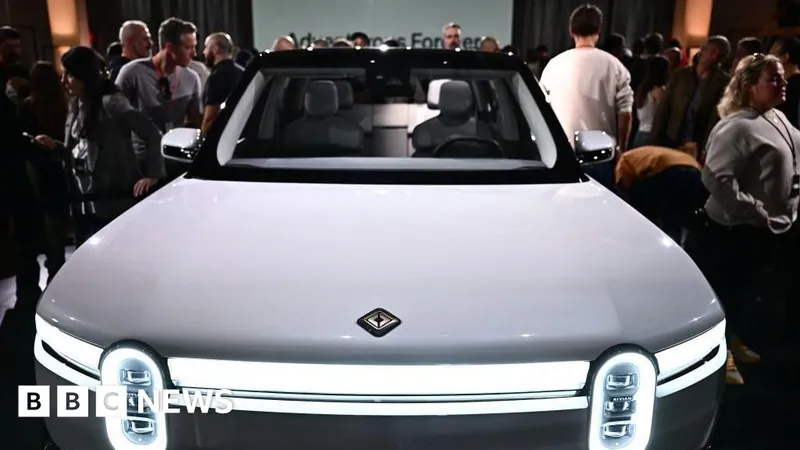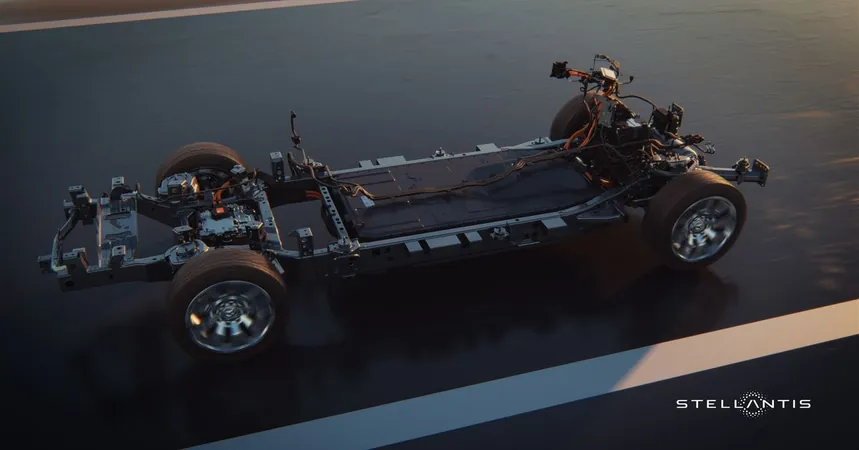
VW's Bold $5.8 Billion Partnership with Rivian: What This Means for the EV Market
2024-11-12
Author: Ting
Introduction
In a groundbreaking move that could reshape the electric vehicle (EV) landscape, Volkswagen Group (VW) has announced a significant joint venture with Rivian, an up-and-coming American EV manufacturer. This partnership has now escalated to a massive $5.8 billion investment, a notable increase from VW's initial commitment of $5 billion. The announcement triggered an impressive surge in Rivian's stock, which skyrocketed more than 9% in after-hours trading.
The Need for Collaboration
As global demand for electric vehicles slows and competition from aggressive Chinese automakers increases, this collaboration aims to pool resources and share essential technologies between the two companies. The partnership comes at a critical time for Rivian, which has been facing challenges as it prepares to launch its new R2 model—a more compact and affordable sports utility vehicle (SUV)—next year.
Financial Implications
Notably, this joint venture is expected to provide Rivian, which has yet to achieve profitability, with much-needed funds. In turn, VW can integrate Rivian’s innovative technology into its vehicle lineup. The first VW models featuring Rivian's cutting-edge technology are anticipated to hit the market by 2027, signaling a new era for the iconic German brand as it attempts to catch up in the increasingly competitive EV market.
Joint Efforts to Innovate
In a joint statement, the two companies expressed their intention to combine their strengths, aiming to lower development costs and accelerate the adoption of innovative technologies. Software engineers and developers from both firms will initially collaborate in California, with plans for additional facilities in North America and Europe to bolster their efforts.
Context and Industry Challenges
This partnership arrives amid reports that VW, Europe’s largest automotive manufacturer, is bracing for major cost-cutting measures in response to rising expenses and dwindling sales figures in a rapidly evolving market. The automotive giant, which encompasses prestigious brands such as Audi, Lamborghini, and Porsche, has been grappling with the shift away from traditional petrol and diesel engines.
Rivian's Strategy
Meanwhile, Rivian is proactively reducing costs as it navigates a challenging landscape characterized by weaker demand for electric vehicles. The company has been renegotiating contracts with suppliers and streamlining its manufacturing processes to enhance efficiency.
Expanding Footprint
In addition to SUVs, Rivian is also producing electric delivery vans, primarily designed for Amazon, its largest shareholder. Amazon has placed an order for an impressive 100,000 of these vehicles, all scheduled for delivery by the end of the decade, further solidifying Rivian's foothold in the EV market.
Conclusion
With this strategic alliance, both VW and Rivian are poised to make significant strides in the competitive EV sector. Industry experts are eager to see how this partnership will unfold and what implications it holds for the future of electric vehicles globally. Stay tuned for what could be a transformational moment in automotive history!




 Brasil (PT)
Brasil (PT)
 Canada (EN)
Canada (EN)
 Chile (ES)
Chile (ES)
 España (ES)
España (ES)
 France (FR)
France (FR)
 Hong Kong (EN)
Hong Kong (EN)
 Italia (IT)
Italia (IT)
 日本 (JA)
日本 (JA)
 Magyarország (HU)
Magyarország (HU)
 Norge (NO)
Norge (NO)
 Polska (PL)
Polska (PL)
 Schweiz (DE)
Schweiz (DE)
 Singapore (EN)
Singapore (EN)
 Sverige (SV)
Sverige (SV)
 Suomi (FI)
Suomi (FI)
 Türkiye (TR)
Türkiye (TR)